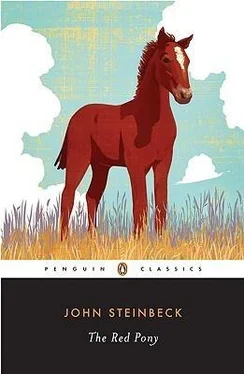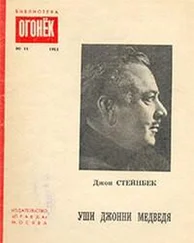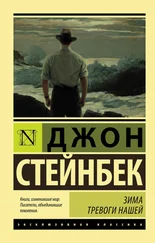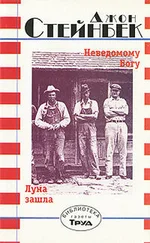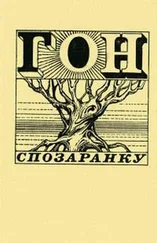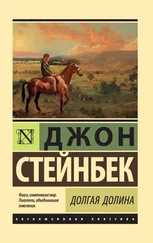Jody listened carefully, for he knew and the whole county knew that Billy Buck was a fine hand with horses. Billy’s own horse was a stringy cayuse with a hammer head, but he nearly always won first prize at the stock trials. Billy could rope a steer, take a double half-hitch about the horn with his riata, and dismount, and his horse would play the steer as an angler plays a fish, keeping a tight rope until the steer was down or beaten.
Every morning, after Jody had curried and brushed the pony, he let down the barrier of the stall, and Gabilan thrust past him and raced down the barn and into the corral. Around and around he galloped, and sometimes he jumped forward and landed on stiff legs. He stood quivering, stiff ears forward, eyes rolling so that the whites showed, pretending to be frightened. At last he walked snorting to the water-trough and buried his nose in the water up to the nostrils. Jody was proud then, for he knew that was the way to judge a horse. Poor horses only touched their lips to the water, but a fine spirited beast put his whole nose and mouth under, and only left room to breathe.
Then Jody stood and watched the pony, and he saw things he had never noticed about any other horse, the sleek, sliding flank muscles and the cords of the buttocks, which flexed like a closing fist, and the shine the sun put on the red coat. Having seen horses all his life, Jody had never looked at them very closely before. But now he noticed the moving ears which gave expression and even inflection of expression to the face. The pony talked with his ears. You could tell exactly how he felt about everything by the way his ears pointed. Sometimes they were stiff and upright and sometimes lax and sagging. They went back when he was angry or fearful, and forward when he was anxious and curious and pleased; and their exact position indicated which emotion he had.
Billy Buck kept his word. In the early fall the training began. First there was the halter-breaking, and that was the hardest because it was the first thing. Jody held a carrot and coaxed and promised and pulled on the rope. The pony set his feet like a burro when he felt the strain. But before long he learned. Jody walked all over the ranch leading him. Gradually he took to dropping the rope until the pony followed him unled wherever he went.
And then came the training on the long halter. That was slower work. Jody stood in the middle of a circle, holding the long halter. He clucked with his tongue and the pony started to walk in a big circle, held in by the long rope. He clucked again to make the pony trot, and again to make him gallop. Around and around Gabilan went thundering and enjoying it immensely. Then he called, “Whoa,” and the pony stopped. It was not long until Gabilan was perfect at it. But in many ways he was a bad pony. He bit Jody in the pants and stomped on Jody’s feet. Now and then his ears went back and he aimed a tremendous kick at the boy. Every time he did one of these bad things, Gabilan settled back and seemed to laugh to himself.
Billy Buck worked at the hair rope in the evenings before the fireplace. Jody collected tail hair in a bag, and he sat and watched Billy slowly constructing the rope, twisting a few hairs to make a string and rolling two strings together for a cord, and then braiding a number of cords to make the rope. Billy rolled the finished rope on the floor under his foot to make it round and hard.
The long halter work rapidly approached perfection. Jody’s father, watching the pony stop and start and trot and gallop, was a little bothered by it.
“He’s getting to be almost a trick pony,” he complained. “I don’t like trick horses. It takes all the—dignity out of a horse to make him do tricks. Why, a trick horse is kind of like an actor—no dignity, no character of his own.” And his father said, “I guess you better be getting him used to the saddle pretty soon.”
Jody rushed for the harness-room. For some time he had been riding the saddle on a sawhorse. He changed the stirrup length over and over, and could never get it just right. Sometimes, mounted on the sawhorse in the harness-room, with collars and hames and tugs hung all about him, Jody rode out beyond the room. He carried his rifle across the pommel. He saw the fields go flying by, and he heard the beat of galloping hoofs.
It was a ticklish job, saddling the pony for the first time. Gabilan hunched and reared and threw the saddle off before the cinch could be tightened. It had to be replaced again and again until at last the pony let it stay. And the cinching was difficult, too. Day by day Jody tightened the girth a little more until at last the pony didn’t mind the saddle at all.
Then there was the bridle. Billy explained how to use a stick of licorice for a bit until Gabilan was used to having something in his mouth. Billy explained, “Of course we could force-break him to everything, but he wouldn’t be as good a horse if we did. He’d always be a little bit afraid, and he wouldn’t mind because he wanted to.”
The first time the pony wore the bridle he whipped his head about and worked his tongue against the bit until the blood oozed from the corners of his mouth. He tried to rub the headstall off on the manger. His ears pivoted about and his eyes turned red with fear and with general rambunctiousness. Jody rejoiced, for he knew that only a mean-souled horse does not resent training.
And Jody trembled when he thought of the time when he would first sit in the saddle. The pony would probably throw him off. There was no disgrace in that. The disgrace would come if he did not get right up and mount again. Sometimes he dreamed that he lay in the dirt and cried and couldn’t make himself mount again. The shame of the dream lasted until the middle of the day.
Gabilan was growing fast. Already he had lost the long-leggedness of the colt; his mane was getting longer and blacker. Under the constant currying and brushing his coat lay as smooth and gleaming as orange-red lacquer. Jody oiled the hoofs and kept them carefully trimmed so they would not crack.
The hair rope was nearly finished. Jody’s father gave him an old pair of spurs and bent in the side bars and cut down the straps and took up the chainlets until they fitted. And then one day Carl Tiflin said:
“The pony’s growing faster than I thought. I guess you can ride him by Thanksgiving. Think you can stick on?”
“I don’t know,” Jody said shyly. Thanksgiving was only three weeks off. He hoped it wouldn’t rain, for rain would spot the red saddle.
Gabilan knew and liked Jody by now. He nickered when Jody came across the stubble-field, and in the pasture he came running when his master whistled for him. There was always a carrot for him every time.
Billy Buck gave him riding instructions over and over. “Now when you get up there, just grab tight with your knees and keep your hands away from the saddle, and if you get throwed, don’t let that stop you. No matter how good a man is, there’s always some horse can pitch him. You just climb up again before he gets to feeling smart about it. Pretty soon, he won’t throw you no more, and pretty soon he can’t throw you no more. That’s the way to do it.”
“I hope it don’t rain before,” Jody said.
“Why not? Don’t want to get throwed in the mud?”
That was partly it, and also he was afraid that in the flurry of bucking Gabilan might slip and fall on him and break his leg or his hip. He had seen that happen to men before, had seen how they writhed on the ground like squashed bugs, and he was afraid of it.
He practiced on the sawhorse how he would hold the reins in his left hand and a hat in his right hand. If he kept his hands thus busy, he couldn’t grab the horn if he felt himself going off. He didn’t like to think of what would happen if he did grab the horn. Perhaps his father and BillyBuck would never speak to him again, they would be so ashamed. The news would get about and his mother would be ashamed too. And in the schoolyard—it was too awful to contemplate.
Читать дальше
